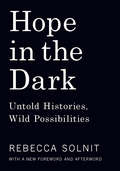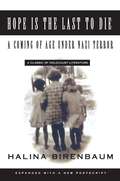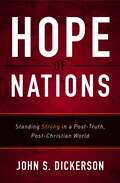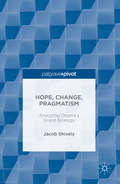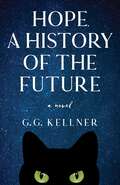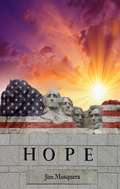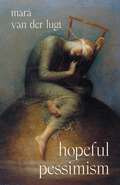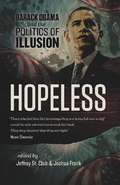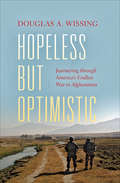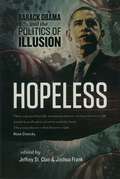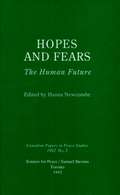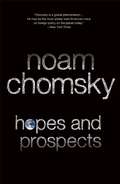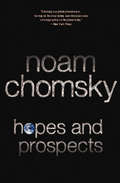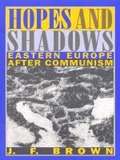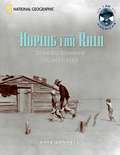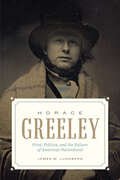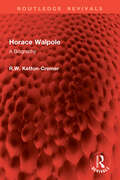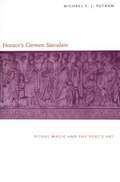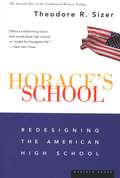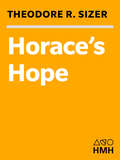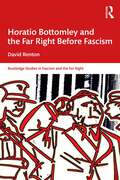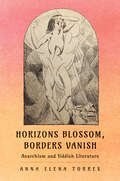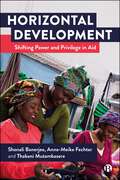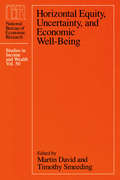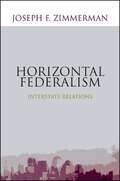- Table View
- List View
Hope in the Dark: Untold Histories, Wild Possibilities (Canons Ser. #51)
by Rebecca SolnitUntold Histories, Wild Possibilities
Hope is the Last to Die: A Coming of Age Under Nazi Terror
by Halina BirenbaumThis book is an important work in Holocaust literature and was originally published in Poland in 1967. Covering the years 1939-1945, it is the author's account of her experience growing up in the Warsaw ghetto and her eventual deportation to, imprisonment in, and survival of the Majdanek, Auschwitz, Ravensbruck, and Neustadt-Glewe camps. Since the old, the weak, and children were summarily executed by the Nazis in these camps, Mrs Birenbaum's survival and coming of age is all the more remarkable. Her story is told with simplicity and clarity and the new edition contains revisions made by the author to the original English translation, and is expanded with a new epilogue and postscripts that bring the story up to date and complete the circle of Mrs Birenbaum's experiences.
Hope of Nations: Standing Strong in a Post-Truth, Post-Christian World
by John S. DickersonEvery week a terrorist attack, riot, or political scandal makes the headlines—and we feel the world around us shaking again. We struggle to separate truth from biased statements and hope from naïveté. We wonder how we got here and where these uncertain days will take us.One of the world’s top investigative reporters, John S. Dickerson, addresses this post-truth, post-Christian society in Hope of Nations. Hope of Nations shows us how and why the world is changing, where those changes will lead, and what it looks like to live like Christ in today’s society. With fascinating historical and political background, Dickerson helps us understand:The five major forces driving global change in the world todayWhy violent displays of Islam continue resurfacingThe incoming moral, social, and political impact of American millennialsTen ways to respond biblically to trends shaping the world right nowHow to live with Christian courage and compassion in tumultuous times“Times of great social upheaval are times of great spiritual opportunity,” writes Dickerson. “You can live the adventure of this era with great purpose. You can know with confidence that the Creator of the universe appointed you to bring light and life to this moment in human history.”Among the youngest award-winning journalists and a seminary-trained pastor, Dickerson brings his reporting skills, generational perspective, and biblical insights to this groundbreaking book.Get a larger view of what is happening with your community, your government, and your international neighbors in this thoughtful look at global events in light of your unique Christian calling.
Hope, Change, Pragmatism
by Jacob ShivelyThis book seeks to uncover a clear picture of Barack Obama's grand strategy, the overarching methods applied to identify and achieve national interests in a global setting. Pressed for an "Obama doctrine" during his final years in office, the President claimed a simple international relations approach: applying all tools at his disposal before resorting for military force. Critics, however, remain unimpressed. They charge the administration with strategic incoherence and weak leadership. Stepping away from ideological and theoretical commitments, Shively applies a simple framework for grand strategy, one that also deepens our systematic understanding. After untangling a complex history and narrating three cases of tumult in 2009, 2011, and 2014, Shively characterizes Obama's grand strategy as "pragmatic internationalism" and argues that it was a promising but poorly implemented approach.
Hope, a History of the Future: A Novel
by G.G. KellnerOne quiet afternoon in 2037, Joyce Denzell hears a thud in her family&’s home library and finds a book lying in the middle of the room, seemingly waiting for her—a book whose copyright page says it was published in the year 2200. Over the next twenty-four hours, each of the Denzell family members discovers and reads from this mystical history book from the future, nudged along by their cat, Plato.As the various family members take turns reading, they gradually uncover the story of Gabe, Mia, and Ruth—a saga of adventure, endurance, romance, mystery, and hope that touches them all deeply. Along the way, the Denzells all begin to believe that this book that has seemingly fallen out of time and space and into their midst might actually be from the future—and that it might have something vitally important to teach them.Engaging, playful, and thought-provoking, Hope is a seven-generation-spanning vision of the future as it could be—based on scientific projections, as well as historical and legal precedence—that will leave readers grappling with questions of destiny, responsibility, and the possibility for hope in a future world.
Hope: Chandler Scott cuarto libro de la serie (Chandler scott #4)
by Jim MosqueraDescripción del libro: ESPERANZA: ¿Puede la nación encontrarla durante la crisis? El cuarto libro de la serie de Chandler Scott. Las fuerzas amenazan con derrocar a la primera mujer presidenta de los Estados Unidos que enfrenta la oposición de fuerzas secesionistas y hostiles en el ciberespacio y dentro de su propio gobierno. El periodista Chandler Scott recibe el llamado para emprender una misión encubierta para salvar su presidencia y asegurar el futuro del país. Durante su búsqueda, se ve obligado a involucrar a las fuerzas oscuras de Internet para ayudarlo a encontrar a la única persona que podría salvar a la presidenta. ¿En quién puede confiar? ¿Tomará la decisión correcta? La nación espera. A los fans de Tom Clancy, Stieg Larsson, The Black Mirror y Man in the High Castle les encantará la serie de Chandler Scott. A medida que EE. UU. Enfrenta tumultuosos desafíos sociales, políticos y económicos, los lectores se conectarán con la situación alarmante y realista del mundo de Chandler.
Hopeful Pessimism
by Mara van der LugtWhy &“hopeful pessimism&” is not a contradiction in terms but a powerful source of moral and political commitmentThe climate debate is rife with calls for optimism. While temperatures rise and disasters intensify, we are asked to maintain optimism and hope, as if the real threat is pessimism and despair. In this erudite and engaging book, Mara van der Lugt argues that this is a mistake: crude optimism can no longer be a virtue in a breaking world, and may well prove to be our besetting vice. In an age of climate change and ecological devastation, the virtue we need is hopeful pessimism.Drawing on thinkers that range from J.R.R.Tolkien and Mary Shelley to Albert Camus and Jonathan Lear, van der Lugt invites us to rethink what we thought we knew about optimism and pessimism, hope and despair, activism and grief. She shows that pessimism is closely linked to a tradition of moral and political activism, and offers a different way to think about pessimism: not as synonymous with despair but as compatible with hope. Gently yet fiercely, van der Lugt argues that what we need to avoid is not pessimism but fatalism or self-serving resignation. Pessimism does not imply the loss of courage or the lack of a desire to strive for a better world; on the contrary, these are the very gifts that pessimism can bestow.What Hopeful Pessimism asks instead is that we strive for change without certainties, without expecting anything from our efforts other than the knowledge that we have done what we are called upon to do as moral agents in a time of change.
Hopeless
by Ralph Nader Jeffrey St. Clair Joshua Frank Kevin Alexander Gray Kathy Kelly"Those who feel that like lemmings they are being led over a cliff would be well-advised not to read this book. They may discover that they are right."--Noam Chomsky "Jeffrey St. Clair and Joshua Frank have skillfully smoked out the real Barack Obama . . . the technofascist military strategist disguised as a Nobel Peace Laureate, but owned, operated, and controlled by Wall Street, Corporate America, and the Pentagon."--Thomas H. Naylor, co-author of Affluenza, Downsizing the USA "The writers assembled here hit hard, with accuracy, and do not pull punches."--Marcus Rediker, author of The Slave Ship: A Human History The Barack Obama revolution was over before it started, guttered by the politician's overweening desire to prove himself to the grandees of the establishment. From there on, other promises proved ever easier to break. Here's the book that dares not let Obama off the hook. It's all here: the compromises, the backstabbing, the same old imperial ambitions. Covering all major "Obummer" categories since he took office, this fast-paced collection will delight the critical and offer food for thought for those contemplating the 2012 electoral circus--and beyond. Jeffrey St. Clair is co-editor of CounterPunch, author of Born Under a Bad Sky and Been Brown So Long it Looked Green to Me, and co-author of Whiteout: The CIA, Drugs, and the Press. Joshua Frank is an environmental journalist and co-editor of Red State Rebels: Tales of Grassroots Resistance in the Heartland. His investigative reports and columns appear in CounterPunch, Chicago Sun-Times, Common Dreams, and AlterNet.
Hopeless but Optimistic: Journeying through America's Endless War in Afghanistan (Encounters: Explorations in Folklore and Ethnomusicology)
by Douglas A. Wissing&“A fascinating ground level account of the effect of absurd and inappropriate Washington strategies on Afghans and on American soldiers.&”—Abdulkader Sinno, author of Organizations at War in Afghanistan & Beyond Award-winning journalist Douglas A. Wissing&’s poignant and eye-opening journey across insurgency-wracked Afghanistan casts an unyielding spotlight on greed, dysfunction, and predictable disaster while celebrating the everyday courage and wisdom of frontline soldiers, idealistic humanitarians, and resilient Afghans. As Wissing hauls a hundred pounds of body armor and pack across the Afghan warzone in search of the ground truth, US officials frantically spin a spurious victory narrative, American soldiers try to keep their body parts together, and Afghans try to stay positive and strain to figure out their next move after the US eventually leaves. As one technocrat confided to Wissing, &“I am hopeless—but optimistic.&” Along with a deep inquiry into the 21st-century American way of war and an unforgettable glimpse of the enduring culture and legacy of Afghanistan, Hopeless but Optimistic includes the real stuff of life: the austere grandeur of Afghanistan and its remarkable people; warzone dining, defecation, and sex; as well as the remarkable shopping opportunities for men whose job is to kill. Silver Medal, War & Military, Foreword Indies AwardsSilver Medal, Current Events, Independent Publisher Book Awards &“A scathing dispatch from an embedded journalist in Afghanistan . . . Pungent, embittered, eye-opening observations of a conflict involving lessons still unlearned.&”—Kirkus Reviews &“Here we confront in granular detail the waste and folly that is America&’s war in Afghanistan.&”—Andrew J. Bacevich, author of The Age of Illusions
Hopeless: Barack Obama and the Politics of Illusion
by Jeffrey St. Clair Joshua FrankThe election of Barack Obama sparked long-dormant tingles of optimism in even the most entrenched political cynics. But the promise of an Obama revolution fizzled out even before his inauguration, as the president-in-waiting stocked his cabinet with corporate hacks, cut secret deals with Wall Street titans and plotted a bloody escalation of the senseless war in Afghanistan. Here is a scathing indictment of the Obama presidency from the best writers on the American Left. Hopeless is a view of Obama's policies from the trenches: the compromises, the backstabbing, the same old imperial ambitions. From Obama's sell-outs to big oil and the nuclear industry to his continuation of savage Bush-era policies in the CIA's global network of secret prisons, this fast-paced chronicle will outrage the politically naive, delight the critical and inspire those looking for an alternative to the dismal politics of lesser evilism. As Emma Goldman famously quipped, "If voting changed anything, they'd make it illegal." Let this book stand as a painful reminder to those who think anything less than social struggle will net tangible gain.
Hopes and Fears: The Human Future (Canadian Papers in Peace Studies #2)
by Hanna NewcombeIt has been said many times that the human future is clouded by multiple and mutually interacting problems. While in the 19th century we had the luxury of believing in almost automatic progress - an "onward and upward" assumption - that belief has been shattered by two world wars, more than 150 smaller ones, the invention of weapons of mass destruction, increasing degradation of the environment, both by pollution and resource exhaustion (i.e. adding "bads" and subtracting "goods" from our natural endowment), a horrendous (and increasing) gap between rich and poor within and between nations, explosions of racism and chauvinistic nationalism, increasing use of torture as a police method, totalitarian regimes, repeated episodes of genocide … not a picture of progress toward a better world. And yet, we have not quite lost faith in the human potential for more beneficial and harmonious development.
Hopes and Prospects
by Noam ChomskyThe most respected analyst of US policy in the world, Chomsky (emeritus linguistics and philosophy, Massachusetts Institute of Technology) updates and expands lectures and articles he delivered from 2006 to 2009. Four essays from Chile and Venezuela cover Latin America and US relations with it, globalization for whom in year 514, the enemies and hopes of democracy and development, and Latin American and Caribbean unity. Seven other papers discuss a wider range of concerns, among them good news in Iraq and beyond, the century's challenges, hope confronts the real world in the 2008 elections, Obama on Israel-Palestine, and the torture memos. Annotation ©2010 Book News, Inc. , Portland, OR (booknews. com)
Hopes and Prospects
by Noam Chomsky&“Chomsky&’s gritty, politically charged essays redefine the nature and practice of democracy in an increasingly unsteady world climate&” (Foreword Reviews). In this urgent book, Noam Chomsky surveys the dangers and prospects of our early twenty-first century. Exploring challenges such as the growing gap between North and South, American exceptionalism (including under Pres. Barack Obama), the fiascos of Iraq and Afghanistan, the US-Israeli assault on Gaza, and the recent financial bailouts, he also sees hope for the future and a way to move forward—in the revival of indigenous cultures and languages and in the global solidarity movements that suggest &“real progress toward freedom and justice.&” Hopes and Prospects is essential reading for anyone who is concerned about the primary challenges still facing the human race. &“A dazzling, informative, arresting piece of work . . . incredibly timely and incredibly thorough, reserving safe ground for no-one and exploring the challenges and problems facing us in today&’s changing world.&” —Seattle PI &“This is a classic Chomsky work: a bonfire of myths and lies, sophistries and delusions. Noam Chomsky is an enduring inspiration all over the world—to millions, I suspect—for the simple reason that he is a truth-teller on an epic scale. I salute him.&” —John Pilger, journalist, writer, and filmmaker &“In dissecting the rhetoric and logic of American empire and class domination, at home and abroad, Chomsky continues a longstanding and crucial work of elucidation and activism . . . the writing remains unswervingly rational and principled throughout, and lends bracing impetus to the real alternatives before us.&” —Publishers Weekly (starred review)
Hopes and Shadows: Eastern Europe After Communism
by J. F. BrownAfter the exuberance that marked the revolutions of 1989, the countries of Eastern Europe have faced the breathtakingly ambitious task of remaking their societies. Simultaneously they have sought to build liberal democracies based on market economics, while confronting reassertions of claims for national independence long suppressed. Taking up where his previous book Surge to Freedom ended, J. F. Brown's Hopes and Shadows analyzes the results of the first four years of Eastern Europe's separation from communist rule and the prospects for the future.The forces at work in the midst of this revolution are examined from a perspective that is necessarily both historical and contemporary as the complex relationship between the tasks that face these countries and the legacy of their communist and pre-communist past shape the difficult present. As the usefulness of the designation "Eastern Europe" is itself questioned, Brown provides both regional and country-by-country analysis of the political situation. The Czech Republic, Slovakia, Hungary, and Poland are grouped together, as are Romania, Bulgaria, and Albania, to address questions such as the development of liberal democratic culture, the activation of democratic institutions and procedures, and the future of former communist bureaucracies. He considers the former Yugoslavia--now torn violently apart--largely as a separate case. The theoretical, political, social, financial, cultural, and psychological dimensions of the transition from socialism to a market economy are discussed in detail. The final aspect of this revolution, the failure of which most immediately threatens the entire process, is the attempt to build new and stable national statehoods. Brown explores the history and impact of the current reemergence of nationalism and the dangers it represents.A comprehensive and authoritative survey, J. F. Brown's analysis and presentation of the contemporary Eastern European political landscape will be essential reading for scholars and specialists and of great interest to general readers.
Hoping for Rain: The Dust Bowl Adventures of Patty and Earl Buckler (I Am American)
by Kate ConnellLike many farmers living in the Great Plains during the 1930s, the Bucklers are ravaged by months of dust storms and drought. Out of desperation, they travel West with their children, Patty and Earl, in hopes of finding new prosperity. Through letters and diary entries written by the Buckler children, readers witness the disaster of the Dust Bowl and the countless days spent wishing for an end to the drought - and their hunger. As they travel across the country, young Earl searches for work so he can help provide for the family. using the children's first-person accounts as well as period illustrations and photographs, the book accurately depicts the devastating effects of the Dust Bowl in the 1930s and '40s.
Horace Greeley: Print, Politics, and the Failure of American Nationhood
by James M. LundbergA lively portrait of Horace Greeley, one of the nineteenth century's most fascinating public figures.The founder and editor of the New-York Tribune, Horace Greeley was the most significant—and polarizing—American journalist of the nineteenth century. To the farmers and tradesmen of the rural North, the Tribune was akin to holy writ. To just about everyone else—Democrats, southerners, and a good many Whig and Republican political allies—Greeley was a shape-shifting menace: an abolitionist fanatic; a disappointing conservative; a terrible liar; a power-hungry megalomaniac.In Horace Greeley, James M. Lundberg revisits this long-misunderstood figure, known mostly for his wild inconsistencies and irrepressible political ambitions. Charting Greeley's rise and eventual fall, Lundberg mines an extensive newspaper archive to place Greeley and his Tribune at the center of the struggle to realize an elusive American national consensus in a tumultuous age. Emerging from the jangling culture and politics of Jacksonian America, Lundberg writes, Greeley sought to define a mode of journalism that could uplift the citizenry and unite the nation. But in the decades before the Civil War, he found slavery and the crisis of American expansion standing in the way of his vision. Speaking for the anti-slavery North and emerging Republican Party, Greeley rose to the height of his powers in the 1850s—but as a voice of sectional conflict, not national unity. By turns a war hawk and peace-seeker, champion of emancipation and sentimental reconciliationist, Greeley never quite had the measure of the world wrought by the Civil War. His 1872 run for president on a platform of reunion and amnesty toward the South made him a laughingstock—albeit one who ultimately laid the groundwork for national reconciliation and the betrayal of the Civil War's emancipatory promise.Lively and engaging, Lundberg reanimates this towering figure for modern readers. Tracing Greeley's twists and turns, this book tells a larger story about print, politics, and the failures of American nationalism in the nineteenth century.
Horace Walpole: A Biography (Routledge Revivals)
by R.W. Ketton-CremerHorace Walpole (1964) was widely acclaimed when it first appeared as the best life of Walpole yet written. It is scholarly and thorough, and since then there is no reason to believe that it has been displaced.
Horace's Carmen Saeculare: Ritual Magic and the Poet's Art
by Michael C. J. Putnam"This is the first book devoted to Horace's Carmen Saeculare, a poem commissioned by Roman emperor Augustus in 17 B. C. E. for choral performance at the Ludi Saeculares, the Secular Games. The poem is the first fully preserved Latin hymn whose circumstances of presentation are known, and it is the only lyric by Horace that we can be certain was first presented orally. Michael C. J. Putnam offers a close and sensitive reading of this hymn shedding new light on the richness and virtuosity of its poetry, on the many sources Horace drew on, and on the poem's power and significance as a public ritual.
Horace's School: Redesigning the American High School (Study Of High Schools Ser.)
by Theodore R. SizerSince the late 1970s, Theodore Sizer has studied and worked among hundreds of American high schools. His research was first published in 1984 in HORACE'S COMPROMISE. Sizer now proposes a process of redesign which respects the best of the rich traditions of secondary schooling while doing far more to educate our youth.
Horaces Hope: What Works for the American High School
by Theodore R. SizerFrom America's "most prominent school reformer" (LOS ANGELES TIMES) comes a stirring personal meditation on what works-and what doesn't-in our high schools today. Revisiting America's classrooms, Sizer assesses the changes over the past decade and a half - from school choice to interdisciplinary learning - that give us reason to be hopeful. Tracy Kidder has called this"an eloquent book. "
Horatio Bottomley and the Far Right Before Fascism (Routledge Studies in Fascism and the Far Right)
by David RentonHoratio Bottomley and the Far Right Before Fascism examines Bottomley’s life and politics, and what made him one of the great figures of Edwardian life. During the first World War, his magazine John Bull sold two million copies a week. Bottomley addressed huge crowds urging them to wage a way of extermination against ordinary Germans. The first chairman of the Financial Times, the inspiration for Toad in The Wind in the Willows, Bottomley was also a major figure in post-1918 politics, urging Conservative voters to dump their leaders and try something new. This carefully researched biography, the first new life of Bottomley for 50 years, shows how he began on the centre-left of Edwardian politics and then moved to the margins, becoming a leading figure on the Edwardian far right, and pre-empting the non-fascist far right of our own days. This book will appeal to scholars and students with interests in political history, fascism and the far right.
Horizons Blossom, Borders Vanish: Anarchism and Yiddish Literature
by Anna Elena TorresA bold recovery of Yiddish anarchist history and literature Spanning the last two centuries, this fascinating work combines archival research on the radical press and close readings of Yiddish poetry to offer an original literary study of the Jewish anarchist movement. The narrative unfolds through a cast of historical characters, from the well known—such as Emma Goldman—to the more obscure, including an anarchist rabbi who translated the Talmud and a feminist doctor who organized for women&’s suffrage and against national borders. Its literary scope includes the Soviet epic poemas of Peretz Markish, the journalism and modernist poetry of Anna Margolin, and the early radical prose of Malka Heifetz Tussman. Anna Elena Torres examines Yiddish anarchist aesthetics from the nineteenth-century Russian proletarian immigrant poets through the modernist avant-gardes of Warsaw, Chicago, and London to contemporary antifascist composers. The book also traces Jewish anarchist strategies for negotiating surveillance, censorship, detention, and deportation, revealing the connection between Yiddish modernism and struggles for free speech, women&’s bodily autonomy, and the transnational circulation of avant-garde literature. Rather than focusing on narratives of assimilation, Torres intervenes in earlier models of Jewish literature by centering refugee critique of the border. Jewish deportees, immigrants, and refugees opposed citizenship as the primary guarantor of human rights. Instead, they cultivated stateless imaginations, elaborated through literature.
Horizontal Development: Shifting Power and Privilege in Aid
by Anne-Meike Fechter Thabani Mutambasere Shonali BanerjeeAccessible and comprehensive, this book puts forth an innovative perspective on international aid, going beyond top-down attempts to centre local voices and practices. By providing an overview of newer iterations and overlooked practices in development, including citizen aid, technologies for development, and faith-based humanitarianism, the book explores the extent to which they disrupt existing models and potentially lead to more equitable grassroots-led approaches. The authors develop the concept of 'horizontal development' to examine how power and privilege operate in international and local horizontal development spaces. Examining challenges, they also highlight opportunities for doing things differently in light of prominent calls for decolonising aid and development.
Horizontal Equity, Uncertainty, and Economic Well-being
by Timothy Smeeding Martin DavidThe result of a National Bureau of Economic Research Income and Wealth conference held in December 1983, this volume looks at the concept of "economic well-being" and the ways that analysts have tried to measure it. In addition to income, economists have begun to consider such factors as pensions, wealth, health, and environment when measuring the well-being of a particular group. They have also begun to measure how consumers respond, successfully or unsuccessfully, to such economic uncertainties as inflation, divorce, and retirement. Using new data and techniques, the contributors to this book concentrate on issues of uncertainty and horizontal equity (the equal treatment of individuals within a defined group). Their work points to better ways of determining how various groups in a society are faring relative to other groups. Economists and policy analysts, therefore, will be in a better position to determine how government programs should be applied when well-being is used as a test.
Horizontal Federalism: Interstate Relations
by Joseph F. ZimmermanCooperative interstate relations are essential for the maintenance of the economic union and the political union established by a confederacy or a federacy. This suggests that interstate relations would be featured prominently in the literature of the U.S. federal system, yet relatively few scholars have studied horizontal state relations. This volume provides detailed information and an analysis of interstate relations, and advances recommendations to improve the economic and political union. The ultimate goal is to stimulate scholarly research on important yet neglected interstate issues.
